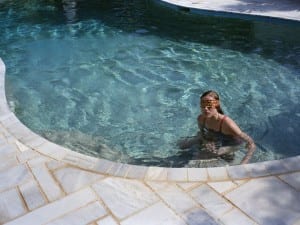Situated at the intersection of art, theory and technology, Sonic Acts has always been inspired by the restlessness of the present moment. For its 25th anniversary, the Amsterdam-based biennial took on the HEREAFTER as its theme: an already-present future of algorithmic capitalism and ecological disaster. Bringing together radically imaginative thinkers and artists for four days of performances, conferences, screenings and exhibitions, the festival asked: how can we better inhabit an unequal planet?
One highlight was Friday’s early-morning Silence Concert in the atmospheric Oude Kerk, Amsterdam’s oldest building. Small murmurs of live saxophone and bass clarinet mounted into chorus with The Instrument of Troubled Dreams, the Kerk’s adapted Mellotron. A recorded voice from beyond the apocalypse spoke of rising floods and endless rain, looping into a delicate reflection on climate and sublime threat. 14 hours later, in the wood-panelled belly of Paradiso, an explosive improvised “conversation” happened between saxophonist Mette Rassmussen and a hovering drone. In these divergent sonic dialogues, answers were not offered, instead demonstrating a range of approaches and media.
HEREAFTER succeeded in curating a clash of ideas; a space where critical academic research could be refracted through live art. What might be misread as incongruity – particularly in contrast to more focused Dutch festivals like REWIRE – is in fact core to Sonic Acts’ transformative ambition. As philosopher Rosi Braidotti underlined in her presentation, “words are sonic acts.” And indeed, “noisy” actions of resistance in scholarship, sound-making and visual art can become tools to tackle global issues.
This was precisely the mission of the specially-commissioned opera, TIME TIME TIME (2019). Realised in collaboration between Jennifer Walshe and Timothy Morton – an inventive artist-composer and leading ecologist-philosopher, respectively – the performancecomprised text, music, film, animation, and tiny fossils offered to each audience member. An iris-like simulation of “our little planet, figuring itself out” in lava and oceanic flows marbled above Walshe, three other musicians, and Morton, who maintained an unmoving meditative posture throughout. A meta-diva in floor-length green sequins, Walshe vocally shapeshifted through ironised efficiency speak, manic dinosaur-inspired outbursts, and moving poetic reflections.
Synthesising playfulness, performance and philosophy, TIME TIME TIME was a tender portrait of our confused human existence, reflecting the cross-disciplinary ideas that Sonic Acts advocates. It was a fitting finale to the festival – a vivid cacophony of voices, calling out to alternate tomorrows.
Fiona Glen
Sonic Acts: HEREAFTER took place 21-24 February. Find out more at www.2019.sonicacts.com.
Credits:
1. Roly Porter & MFO at Paradiso. Courtesy of Sonic Acts Festival. Credit: Pieter Kers.





